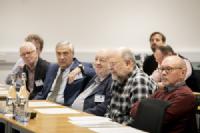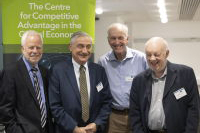Nicholas Crafts turns 70

Nicholas Crafts turns 70
Monday 1 Apr 2019We celebrate our Director's birthday
 |
 |
 |
On Friday 15th to Saturday 16th March we celebrated the illustrious career of Professor Nicholas Crafts (centre director), with a two-day conference. Over 60 delegates attended talks from 16 leading academics, including keynote lectures from Joel Mokyr, Northwestern University, on ‘British Economic Exceptionalism’ and Gavin Wright, Stanford University, on ‘The Rise and Fall of Regional Convergence in the United States’.
The highly enjoyable event was held at the Radcliffe Conference Centre at Warwick University and organised by Sascha Becker, Stephen Broadberry and Bishnupriya Gupta.
Nick will be retiring at the end of August 2019.
Professor Tim Hatton’s account of the Conference to celebrate the career of Professor Nick Crafts on his 70th Birthday
A two-day conference at the University of Warwick, celebrated the career of Professor Nick Crafts on the occasion of his 70th birthday. He has been a leading light in British economic history for four decades and has changed our view of the timing, tempo and causes of economic growth and development since the 18th century. Along the way he has accumulated a large and influential set of publications and has been recognised with a number of honours including the award of the CBE in the 2014 Queen’s birthday honours. The audience and presenters included a glittering array of colleagues and friends, past and present, including a number of Nick’s former graduate students who have since become leading scholars.
Professor Joel Mokyr (Northwestern) opened the proceedings with a spirited rendition of the debate on why Britain was the first country to industrialise. A range of features contributed, including the institutional and social structure, geographical endowments and the diffusion of technological and scientific ideas. But he gave a special place to upper tail human capital and in particular the ‘useful skills’ of the artisanal class. He argued that, in comparison to other European countries such as France, there was an abundant supply of practical skills. These were created by the flourishing apprenticeship system which, while it created contractual issues, broke the reliance on transmission of skill from father to son. The preindustrial setting was important and Mokyr revived the notion of proto-industrialisation as a key precondition.
Professor Barry Eichengreen (UC Berkeley) gave a special lecture inspired by the recent debate about the underpinnings of Trump and Brexit. He drew parallels with the interwar period when the industrial heartlands of Britain suffered protracted decline. On that occasion the radical solution was adopting tariff protection and leaving the gold standard, but the rising exchange rate undid whatever positive effects on employment the tariff may have brought. He stressed that turning inwards and providing protection from competition can slow productivity growth, a point stressed by Nick Crafts in his work on the early post war period, and an important lesson for today.
The following day the keynote was given by Professor Gavin Wright (Stanford) who pointed out that a century of economic convergence among US states and regions had come to an end in about 1980. He argued that this was not due to declining mobility, faltering technological transfer or institutional rigidities. Rather, there was a number of specific shocks mostly connected with trade globalisation. In the great lakes region, the metal based industries declined with depletion of iron ore deposits and competition from Japan; later, the end of the multi-fibre agreement decimated textiles in the South. On the other hand, government-led research and development stimulated growth in the West while hi-tech industry boosted the New England economy.
Other speakers presented their latest research findings, often related to, or stimulated by, Nick’s work. The topics included skills, technology, growth and standards of living from preindustrial times to the 1930s as well as railways, urbanisation and regional integration in Europe. At the conference dinner Professor Mark Thomas (Virginia) led a range of tributes to Nick’s influence, both academic and personal, to which Nick modestly replied that his career had turned out somewhat better than he had anticipated.
Tim Hatton
Professor of Economics, Department of Economics, University of Essex
March 2019

